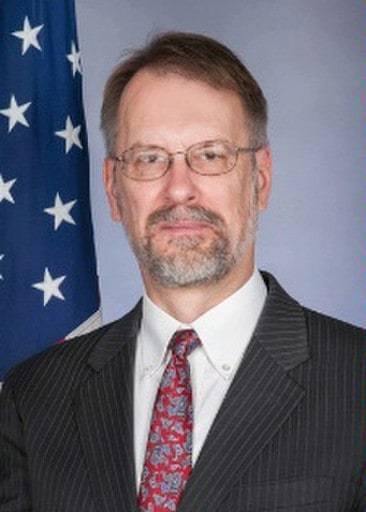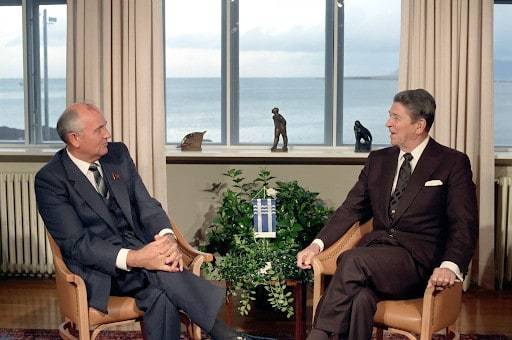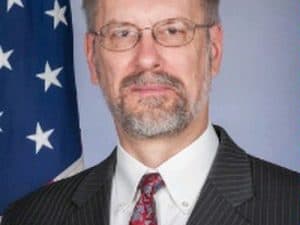Foreign service officers are often subject to circumstances beyond their control. Such was the case when a diplomatic quarrel occurred in October 1986. Around the same time of the Reykjavik summit, in which President Reagan and Soviet leader Gorbachev disagreed over Reagan’s proposed Strategic Defense Initiative, the U.S. and Soviet Union began expelling diplomats from each other’s embassies and consulates.

In addition, the Soviet Union withdrew all foreign service nationals from the U.S. Embassy in Moscow. While White House Press Secretary Larry Speakes did assert that these actions—mentioning the expulsion of fifty-five Soviet diplomats from the United States—should not hinder an arms accord and diplomatic relations, the U.S. Embassy in Moscow did end up short staffed and overworked.
Allan Mustard, the assistant agricultural attaché at the U.S. Embassy in Moscow at the time, experienced firsthand the consequences of this diplomatic clash. The withdrawal of local embassy employees added to Mustard’s usual workload and resulted in an overworked and backlogged embassy that still had to manage important tasks, such as assembling steel shelving on the inside of an improvised warehouse on the embassy compound, and an unforeseen, unreasonable request by the Soviet Foreign Ministry. In this “Moment in U.S. Diplomatic History,” we see how Mustard humorously recalls these events, acting both as construction worker and duty officer on top of his official duties.
In addition to being assistant agricultural attaché in Moscow, Mustard also served the Foreign Agricultural Service in Istanbul, Vienna, Mexico City, and New Delhi, and was Ambassador to Turkmenistan between 2014 and 2019. Additionally, Mustard holds an MS in agricultural economics from the University of Illinois Urbana-Champaign, and he served as chair of the OpenStreetMap Foundation. In 2019, Mustard received the United States Department of Agriculture’s Distinguished Honor Award.
Allan Mustard’s interview was conducted by Ted MacLaughlin on March 11, 2021.
Read Allan Mustard’s full oral history HERE.
Drafted by Alek Blonk
ADST relies on the generous support of our members and readers like you. Please support our efforts to continue capturing, preserving, and sharing the experiences of America’s diplomats.
Excerpts:
“We went to a stance of an embassy that was hanging on by its fingernails.”
A first-tour officer makes U.S. government policy:
I have written an article for Foreign Service Journal about what it was like to lose the Foreign Service nationals, and I’ll just mention that in passing here, that in October of 1986 we got into a spat, a diplomatic spat, with the Soviets in which we began expelling people from each other’s embassies and consulates, and it culminated in not merely the expulsion of diplomats but the Soviets withdrew all of our local employees and we went to a stance of an embassy that was hanging on by its fingernails….
But a couple of anecdotes that are not in that story I’d like to relate. One was I had the happy opportunity to be duty officer for the embassy the weekend after the local employees were withdrawn, and being a duty officer in the American embassy, one of the things that you had to do in the old days was Saturday morning you went up to the ambassador’s office, you picked up the telegrams from the cable unit, then you sat down, and they were all printed out on paper, of course, they used these multi-ply forms that they printed out on line printers. You would take the ambassador’s copies and you would make three stacks….

The 1986 Reykjavik Summit happened in the midst of a diplomatic quarrel between the U.S and the Soviet Union | Wikimedia
I’m sitting there and I’m doing this and I’m sorting the cables and the phone rings. It’s the duty officer at the Soviet Foreign Ministry, and he says to me in absolutely impeccable English that he has 150 Soviet citizens who are booked on the Aeroflot flight the next day, Sunday, to fly to New York, but they don’t have visas, so they need for us to call in our consuls, put them to work stamping visas in the passports of these 150 passengers, or they’re not going to be able to fly to New York. He got done explaining all this and I said to him, “Well, as you’re aware, earlier this week the Soviet government unilaterally withdrew all of our local employees from the embassy and as a result our consular section is somewhat short staffed. As a result a backlog has developed of visa issuance and I’m afraid that these 150 travelers will not receive their visas until the consular section can get to them.”
And he said to me, “I’m afraid you don’t understand.” I replied to him, now in Russian, I said, “No, you didn’t understand.” I repeated what I just said to him in English back to him a second time, only this time in Russian, and at the end of that, I said in Russian, so did you understand? He answered back with one word in Russian: “Yasno,” which literally means “clear,” and meaning it’s clear, which is something Russians say when they get it. Okay, he got it, he understood that I was not gonna budge on this. So I flipped back into English and I said, “Thank you very much for your call. I will inform the consul general that these people are waiting for their visas, and I assure you that we will act on them as quickly as we can.” And that was that.
So Sunday went by and Monday morning I went into work….So I went in, sat down next to Pat Kim, who was the number two in the consular section, and said, “Oh, Pat I got a story I gotta tell you.” And so I told her what I had done on Saturday. She looked at me, she said, “You did what?” I said, “I blew him off. Come on, the guy was being totally unreasonable. You guys have been working twelve-hour days. I know you’ve been working twelve-hour days since the FSNs left.” She said, “Did you call the DCM and consult with him?” I said, “Of course not, why would I do that? The answer was obvious. It was clear to me what needed to be done. Why would I not do that?” She buried her face in her hands and said, “Thank God Agriculture had duty this weekend, because if it had been a State officer, the State officer would’ve called the DCM, the DCM would’ve said, yes, he would’ve called us all back in, and we would be working weekends for the rest of our tours of duty. But now we’re going to have weekends off, thanks to you. And they’ll back you up, they will not reverse your decision now that it’s been made,” which was true. They didn’t. So for the first time in my career, as a first-tour officer who had been at post, let’s see, July, August, September, at that point October, so four months, I’d been at post, I made U.S. government policy.
“They took two political officers, put them in the room with these boxes and said, Please assemble the shelves.”
A jack of all trades:
So that’s one anecdote. The other anecdote I want to tell you about all-purpose duty was that we literally were doing anything that needed to be done, any sort of physical labor….One of the issues the embassy had was they had this warehouse that was way across town. It was in a neighborhood called Obrucheva. The Obrucheva warehouse was a good hour’s drive away, so if you wanted some pads of paper, you needed some more ballpoint pens, somebody had to go over to the warehouse and bring them back and when we had FSNs, local employees, you have a lot of people who could drive across town, retrieve stuff, and bring it. We lost the FSNs and now it was, we need to pre-stage this stuff closer to the embassy. So we carved out some space on the new embassy compound to be what amounted to a small warehouse. They ordered in steel shelving. It all came in boxes, you know. It’s the kind of stuff that you can buy from Grainger or one of these outfits. They took two political officers, put them in the room with these boxes and said, Please assemble the shelves. At the end of one eight-hour shift they had assembled one shelf.
Q: They could write cables but couldn’t use tools.
MUSTARD: Right, they could write cables but they couldn’t use tools. So the next day I was up, it was my day for all-purpose duty, and Rich Jaworski was the assistant GSO in charge of this project. He said, “I was going to try and get someone else to help you, but nobody else was available, so you have to go alone. Just see if you can build at least one more shelf, would you please?” I said, “Sure,” so I went in then, and I looked at the one they’d assembled, and they hadn’t assembled it right, hadn’t put angle braces on it and hadn’t used the washers, either. So I had to disassemble it. I reassembled it properly, racked it so it was square, and cinched everything down, and methodically started pulling the parts out of the box.
Once you’ve built one of them you know how they go together, you don’t have to read the instructions again, so I just buzzed through them. At the end of eight hours I had the entire thing filled up, and had all the shelving built. So I walked back up to the general services office, up the hill, and reported to Jaworski. And he said, “So how many did you get built?” I said, “It’s done, I’m done.” He said, “Bullshit.” I said, “No, it’s not bullshit, come take a look.” So we went down and he was standing there, staring at all of these shelves that are built, and says, “I don’t get it, you came down here alone, you did all of this, and two of them working here for eight hours, two of them, and they built one.” And I said, “Yeah, I had to take it apart and put it back together again. They didn’t do it right.” So he said, “I gotta find out what happened.” So he did. It turned out that when these two political officers had gone in there, they had opened up the toolbox and they had only recognized two of the tools, a screwdriver and a pair of pliers, and they knew the screwdriver was not the proper tool, so they had tried to assemble this thing using pliers. And they had just mashed up their knuckles, you know, the pliers slipping and banging against the steel shelving. I of course went in with a box-end wrench and a socket wrench and, you know, boom, it was pretty simple to put those things together.
And so anyway Jaworski and I were comparing notes afterwards and I said, “You know, Rich, what this proves? He says, “What’s that?” “It proves that State Department officers are subhuman.” And he said, “How do you figure that?” I said, “Well, Homo sapiens is known as the tool-using animal, and State Department officers don’t know how to use tools.”
TABLE OF CONTENTS HIGHLIGHTS
Education
BA in Political Science, University of Washington, 1978
BA in Slavic Languages and Literature, University of Washington, 1978
MA in Agricultural Economics, University of Illinois at Urbana-Champaign 1982
Joined the Foreign Service 1982
Moscow, Soviet Union—Assistant agricultural attaché 1986–1988
Vienna, Austria—Agricultural counselor 1996–2000
Mexico City, Mexico—Agricultural minister-counselor 2008–2011
Ashgabat, Turkmenistan—Ambassador 2014–2019

